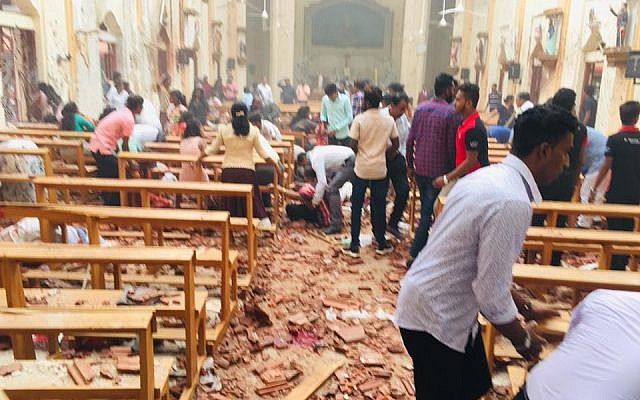“All explosives possessed by the terrorist group has been seized. Almost everyone identified with the group have been arrested. Two of their bomb experts have died in the clashes. The police can happily announce that everyone with direct links have been either arrested or killed by now,” Wickremaratne said

All the Islamic extremists involved in the Easter suicide bombings are either killed or arrested, Sri Lankan police and military chiefs have claimed, assuring that the country is now safe and can get back to normalcy.
The tri-forces commanders and the police chief, addressing a press conference on Monday night, said the security of the country following the April 21 bombings that left 257 people dead has been ensured with adequate measures and steps have been taken to implement a special security plan.
Acting Inspector General of Police (IGP) Chandana Wickremaratne said that all those directly linked to the attacks on three churches and three luxury hotels have been arrested or were killed.
He also said that all the explosives believed to be linked to local Islamist outfit National Thowheeth Jama’ath (NTJ), blamed for the attacks, have been found.
“All explosives possessed by the terrorist group has been seized. Almost everyone identified with the group have been arrested. Two of their bomb experts have died in the clashes. The police can happily announce that everyone with direct links have been either arrested or killed by now,” Wickremaratne said.
Wickramaratne did not say how many people have been arrested over the bombings, but police spokesman Ruwan Gunasekera on Monday said that 73 people, including nine women, were arrested and being questioned by the CID and the Terrorist Investigation Department (TID).
The police spokesman also said the Criminal Investigation Department (CID) identified more than Rs 140 million cash and other assets worth over Rs 7 billion belonging to the NTJ.
The Islamic State terror group claimed the attacks, the island nation’s worst, but the government blamed ISIS-linked local Islamist extremist group NTJ.
Wickramaratne, who was named acting police chief last week after President Maithripala Sirisena suspended his predecessor over his failure to act on intelligence warnings about the attacks, said the country can now get back to normalcy with the lifting of curfews imposed after the attacks.
Wickramaratne urged the public not to be misled by unverified reports.
The government reopened schools on Monday, but attendance dropped to below 10 per cent in many places with parents still fearing attacks.
Wickremeratne said a joint security operation with schools authorities are underway. He pointed to unverified security fears spread through social media as the cause for unfounded security concerns.
Army chief Lt Gen Mahesh Senanayake said the military has taken steps to ensure national security under the emergency regulations.
He said that over the past two weeks normalcy was returning to the country and the public must not be misled by false claims.
All security measures to ensure safety in the country has been taken. The security forces were empowered by the emergency regulations since the attacks,” Lt Gen Senanayake said.
The Army chief urged the public to return to their day to day activities.
The tourism industry leaders have urged the government to make strong measures to enable the industry to revive following the Easter Sunday attacks on three leading hotels.
The suicide bombers attacked breakfast rooms of the Shangri La, The Cinnamon Grand and the Kingsbury Hotels.
The attacks in which 44 foreigners including 11 Indians were killed prompted adverse travel advisories.
At the moment most bookings are cancelled, with less than 10 per cent of occupancy we are in trouble,” Hoteliers Association president Sanath Ukawatta said.
The government has already decided on a package of concessions to the tourism industry which contributes 5 per cent of the island’s GDP.
The Tourism Authority said the total number of tourist arrivals during April was 166,975. This is a year on year decline of 7.5 per cent as the arrivals were 180,429 in April 2018.




